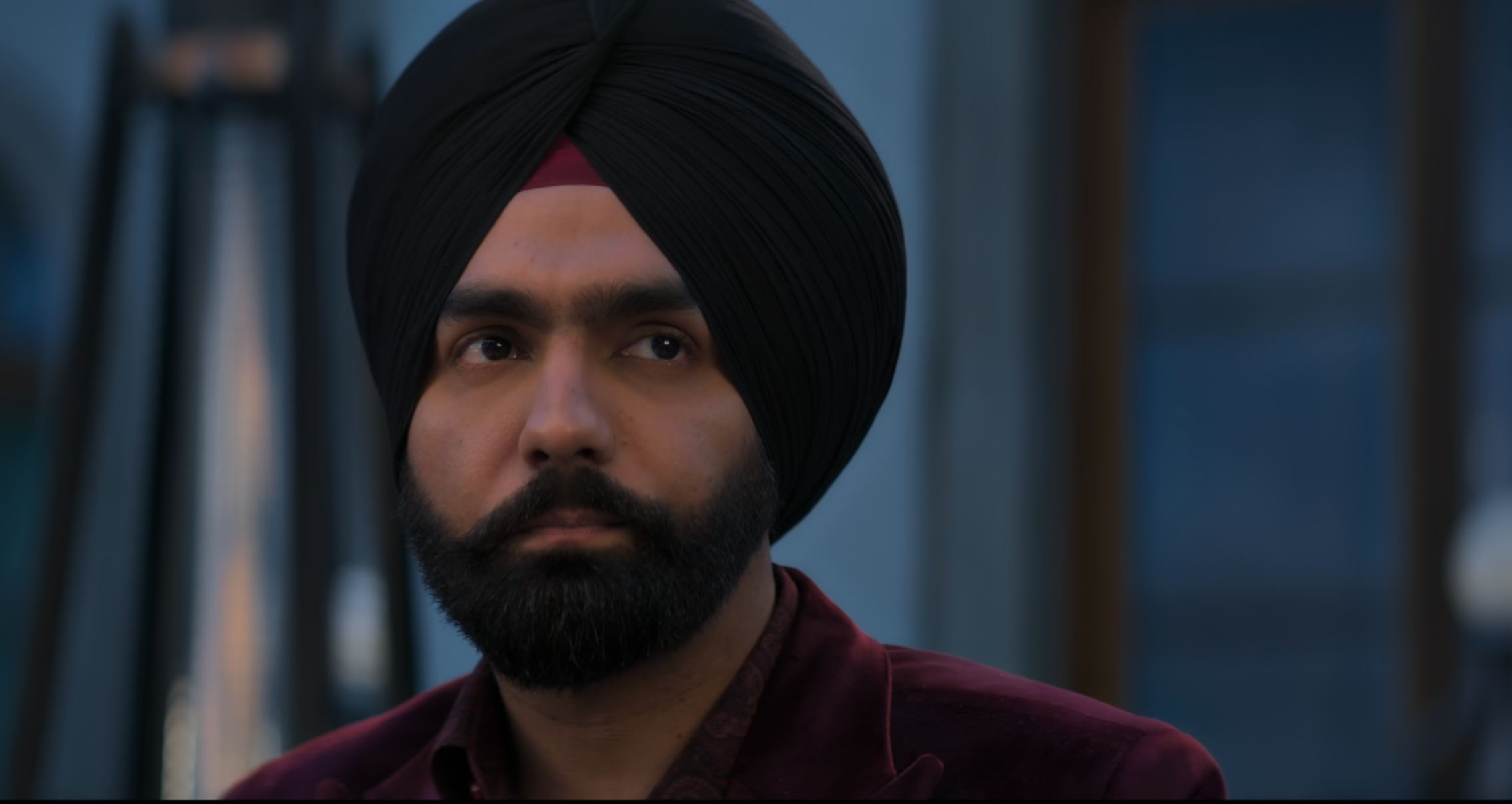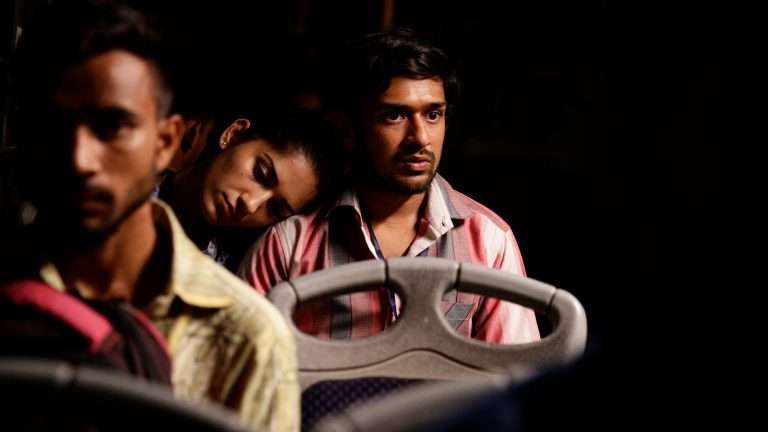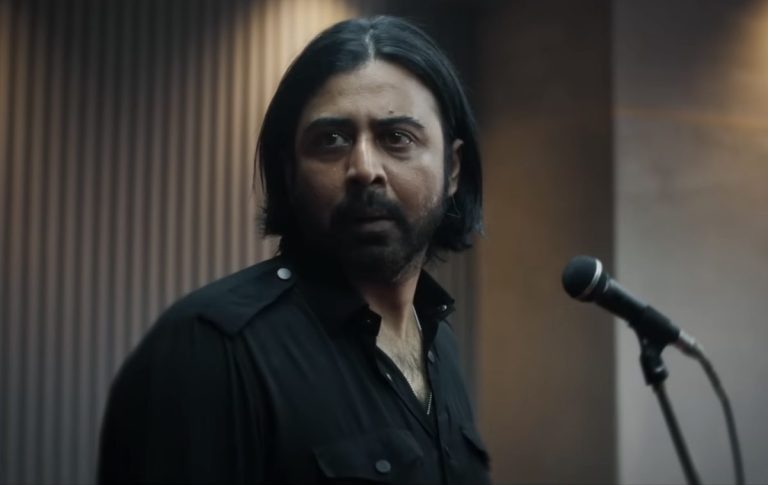With nearly 27 or 28 adaptations preceding it, Mudassar Aziz and Akshay Kumar introduce the Bollywood version of the 2016 Italian film Perfetti Sconosciuti (Perfect Strangers), titled Khel Khel Mein. Is it a flawless adaptation? Perhaps not. However, Aziz truly shines in how he collaborates with his cast, giving them ample space to breathe within the narrative, which heightens the intrigue and tension of the plot.
Aziz also uses symbolic shots, such as statues, to visually underscore moments when characters engage in infidelity. But when does the story gain momentum? And how does Khel Khel Mein set itself apart from the original Perfect Strangers? Let’s explore the plot of this Akshay Kumar-led film before delving into those questions.
Spoilers Ahead
Khel Khel Mein (2024) Plot Summary & Movie Synopsis:
What Was the State of the Relationships Before the Get-Together?
The film opens with Rishabh, a successful cosmetic surgeon, who is eager to reunite with his wife, Vartika, in Delhi. He has to travel to Jaipur for his sister’s wedding. His excitement is mixed with distraction, as his casual flirtation with Kadambari on the flight reflects a lack of emotional depth in his marriage.
Despite being proud of his British citizenship and his accomplished wife, he seems to crave attention and validation from outside relationships. Rishabh’s decision to exchange numbers with Kadambari hints at his internal struggle to fully commit emotionally, despite his external success and settled life.
On the other hand, we see another couple, Harpreet and his wife, Harpreet (yeah, same names), are weighed down by their efforts to conceive. Their relationship is strained by the singular focus on fertility treatments, leaving little room for emotional connection. The silence between them speaks volumes about their growing distance.
Their shared relief when meeting friends at the wedding suggests that they use social events as an escape from their personal struggles. Their journey to the wedding is less about celebration and more about temporarily stepping away from the tension that defines their marriage.
Rishabh’s cousin Samar’s anticipation of the wedding is filled with a sense of unease, particularly in his strained relationship with his father-in-law. Though Samar shares a good relationship with his wife, Naina, her unspoken depression creates a hidden barrier between them. Samar remains unaware of her struggles, focusing on maintaining appearances and looking forward to a break.
For Naina, the wedding offers a temporary escape, though she silently battles her mental health issues. Lastly, their friend Kabir’s arrival without his girlfriend adds a touch of disappointment to the whole gang. But his success as a cricket coach brings a sense of shared happiness, momentarily lightening the mood.
What was the Origin behind the Game?
The game originates from a deep-rooted tension between the individuals in the group regarding honesty and infidelity. The men: Rishabh, Harpreet, Kabir, and Samar, show a casual attitude toward their friend’s cheating. They believe the situation could have been avoided if the affair had been better concealed. This mindset suggests that secrecy, rather than fidelity, is the priority for them. The women: Vartika, Harpreet, and Naina, are disturbed by this, particularly by the notion that men protect each other’s secrets, even if it means justifying wrongdoing.
Vartika, already dealing with the strain of her impending separation from Rishabh, sees smartphones as the enablers of deceit. Her proposal for the game is driven by a desire to confront the issue of hidden secrets. She forces the game to challenge the men’s casual attitude toward infidelity and secrecy. By suggesting that everyone reads aloud their private messages and takes calls on the speaker, she aims to expose any dishonesty and bring accountability into the group. The game is her way of pushing the group, especially the men, to confront their complicity in covering up secrets and infidelity.
How does the Game start to destroy the Couples?
The game begins to unravel Rishabh and Vartika’s relationship when Rishabh receives an email from an escort service. Despite his elaborate explanation involving his colleague, Dr. Malhotra, Vartika sees through his excuse, believing it to be a lie. Rishabh’s insistence on his innocence and attempt to prove it by leaving a voicemail only deepen the mistrust between them. Vartika already has doubts about their marriage, especially with their planned trial separation, and this incident confirms her suspicions about Rishabh’s dishonesty.

Harpreet, the husband, tries to manipulate the game by switching phones with Kabir to hide his rekindled relationship with an old girlfriend. His decision to deceive his friends and wife backfires when a risqué image and messages about match-fixing appear on his phone, which everyone mistakes for Kabir’s. The confusion leads to Kabir losing his job, and the situation spirals further when messages from Akash Verma hint at Harpreet’s possible homosexuality.
Harpreet, the wife, is already dealing with the strain of fertility issues, and the revelation of her husband’s low sperm count adds another layer of mistrust. Harpreet’s meltdown over his wife’s visit to a sperm clinic only highlights the lack of communication in their marriage. His inability to be honest about his issues, both marital and personal, accelerates their downfall, as secrets pile on top of each other, eroding whatever trust remains.
What is the tension between Kabir, Samar, and Naina?
Kabir, trying to help Harpreet by switching phones, becomes an unintended victim of the chaos. The confusion over phone messages leads to the revelation of Kabir’s sexual orientation before he is ready to share it. As his relationship with Akash Verma comes to light, Kabir is forced to come out as gay in a setting fraught with judgment.
His decision to take the blame for Harpreet’s deception shows his loyalty to his friends, but it also reveals how deeply he has been hiding his true self. Kabir’s sexuality becomes a point of tension, especially with Samar, whose homophobic remarks reflect his discomfort with the revelation. The game forces Kabir into a vulnerable position, where he not only loses his job but also has to face his friends’ mixed reactions to his coming out.
For Samar and Naina, the game’s destruction is rooted in Samar’s affair with Malti. Naina’s suspicion is confirmed when she learns of an expensive necklace Samar bought for Malti, leading to his confession about the affair. Samar’s betrayal crushes Naina, who is already fragile due to her struggle with depression.
His admission that he had to engage in the affair to secure work projects and promotions adds insult to injury, reducing their marriage to a transactional relationship. Samar’s infidelity not only damages his relationship with Naina but also casts a shadow over his moral character, revealing that he is willing to compromise his values for personal gain.
What Happens to Samar?
Samar’s actions stem from overwhelming guilt after his affair with Malti is exposed. Naina’s decision to walk out of the hotel room pushes him to follow her, to save her from her suicidal thoughts, and to confess the depth of his guilt. Samar’s confession about Naina’s depression feels like an attempt to justify his past actions, hoping it might explain why their relationship had become strained. However, his guilt consumes him. He reaches a point where he feels as though suicide is the only way to atone for his betrayal.
On the hotel terrace, Samar and Naina are both on the brink of making a tragic decision. While Naina’s suicidal thoughts are driven by her untreated depression, Samar’s are born out of the realization that his affair has likely destroyed his marriage. Rishabh and Kabir, the older and more composed members of the group, try to prevent the worst from happening, but Samar’s guilt clouds his judgment. His decision to jump is impulsive and rooted in self-punishment. Fortunately, fate intervenes as he is saved by falling into the hotel’s decorations.

Samar’s survival brings a moment of reflection. His embrace with Kabir highlights his desperation for forgiveness, not just from Naina but from his friends as well. Kabir’s response, that apologies are earned, forces Samar to confront the reality that redemption requires time, effort, and genuine change. Moving forward, Samar must face the long road ahead, where he will need to prove his loyalty to Naina if she is willing to give him a second chance. His journey now centers on repairing the damage caused by his betrayal, a task that may take a lifetime.
Khel Khel Mein (2024) Movie Ending Explained:
How does Rishabh Save Vartika’s Sister’s Marriage?
Rishabh steps in to save Varun’s marriage after learning that Varun has fled the hotel due to cold feet. As someone who has been through two marriages and fatherhood, Rishabh is seen as the voice of experience, capable of convincing the groom to return. Despite the turmoil in his own marriage with Vartika, Rishabh focuses on helping Varun navigate his fear, knowing how overwhelming the pressure of marriage can be.
Rishabh’s insight into marriage comes from his own struggles and past mistakes. He acknowledges that marriage is daunting and admits that everyone, including himself, has their own set of issues. He reassures Varun that fear and uncertainty are natural when making such a life-changing decision. Instead of lecturing him, Rishabh uses a compassionate approach, telling Varun that marriage is about building good memories over time and that it’s okay to feel nervous. His key message is that with Vartika’s sister by his side, Varun will eventually find the courage to embrace marriage.
By connecting with Varun’s emotional turmoil, Rishabh manages to calm him down and offer practical advice. He emphasizes that while marriage may come with challenges, it is also an opportunity to create joyful memories. Varun learns from Rishabh’s wisdom and gains the confidence to return, realizing that his fears don’t mean the marriage is doomed. Rishabh’s support ultimately saves the wedding, allowing Varun to take a stand and commit to a future with Vartika’s sister.
Is Rishabh actually Cheating on Vartika?
Rishabh’s involvement with the escort service email is clarified when Naina reveals that Varun and his friends had used Rishabh’s card to book an escort for Varun’s bachelor party. Rishabh merely helped them to avoid suspicion, which explains the suspicious email. Vartika is relieved to learn that her husband did not cheat on her. This revelation temporarily eases the tension in their marriage. While Rishabh may not have physically cheated on Vartika, his emotional boundaries remain questionable.
The last scene, where Kadambari messages Rishabh, implies that his flirtation with her may not have ended. Although he and Vartika have agreed to give their marriage another chance and be more honest about their needs, the presence of Kadambari complicates things. Rishabh’s flirtation suggests a potential weakness, hinting that he might be tempted to stray emotionally, even if he refrains from physical infidelity.
What happens to the others?
Samar’s apology to Naina does not hold much weight. The betrayal, especially during her battle with depression, is too significant to overlook. Their relationship reaches a turning point where they decide to separate for some time, potentially leading to divorce. Naina’s anger is valid, and Samar’s infidelity, particularly when she is vulnerable, is a deep wound. Although they do not find closure at this moment, the separation gives them space to reflect on whether their marriage can be salvaged in the future.
Harpreet and his wife’s situation is better since they have become more transparent than before. For a long time, the lack of honest conversations drove them to hurtful actions. Now, they understand that working on their relationship is more important than focusing solely on conceiving a child. Harpreet’s wife also plans to share her past with him, signaling the beginning of transparency. While their issues are not entirely resolved, this newfound openness offers hope for healing.

Kabir leaves Jaipur feeling liberated. After coming out as gay, he is finally free from hiding his true self and is ready to start a new chapter in his life. He looks forward to finding a job where he won’t face discrimination and hopes to build a future with his partner, Akash. Kabir’s sense of closure lies in embracing his identity and moving forward with optimism.
How is ‘Khel Khel Mein’ different from ‘Perfect Strangers’?
“Khel Khel Mein” and “Perfect Strangers” share a similar premise but diverge significantly in their execution, especially in tone, relationships, and endings. In “Khel Khel Mein,” the story unfolds during a wedding, and some characters, like Naina, are not even clear about whose wedding they are attending. The setting itself is less intimate and emphasizes the disconnection among characters.
In contrast, “Perfect Strangers” centers around a tight-knit group of friends who share a deep history. The personal bonds in “Perfect Strangers” are stronger, making the revelations feel more intimate and impactful, such as Rocco’s secret therapy sessions. While “Perfect Strangers” has a more personal and emotional core, “Khel Khel Mein” leans on situational drama influenced by the larger context of the wedding.
“Khel Khel Mein” also digs deeper into certain issues like Naina’s depression, which is explored in greater detail than in “Perfect Strangers.” The Indian adaptation weaves in societal expectations, mental health stigmas, and emotional suppression that are more reflective of its cultural setting. In contrast, “Perfect Strangers” keeps its focus on the broader theme of privacy invasion through technology, rather than delving into the psychological backstories of its characters.
“Khel Khel Mein” introduces small plot changes to localize the narrative. For example, Samar receives a prank call from Rishabh using the phone of a room service woman, while in “Perfect Strangers,” Rocco’s prank call comes from his daughter’s phone. These changes are more contextual and do not significantly alter the broader theme but add a cultural layer to the adaptation.
The most significant difference lies in the ending. “Perfect Strangers” concludes with a twist. It reveals that the events of the film were merely a ‘what if’ scenario. The game was never played, and the characters leave as if nothing happened, suggesting that their relationships would have remained intact if the game had been avoided. This leaves the audience reflecting on the fragility of relationships and the importance of secrets in maintaining harmony.
In contrast, “Khel Khel Mein” offers a more straightforward ending. While the characters face immense challenges, they begin to recognize their mistakes and take steps toward reconciliation. There is no ‘what if’ scenario; everything that happens is real. The ending suggests that while not all problems are solved, there is a sense of hope and redemption. Even though Rishabh gets a message from Kadambari hinting at possible future infidelity, the overall tone is less cynical than “Perfect Strangers.”
In short, “Khel Khel Mein” provides a more hopeful resolution, focusing on personal growth. But, “Perfect Strangers” presents a darker, more philosophical view of human relationships.






